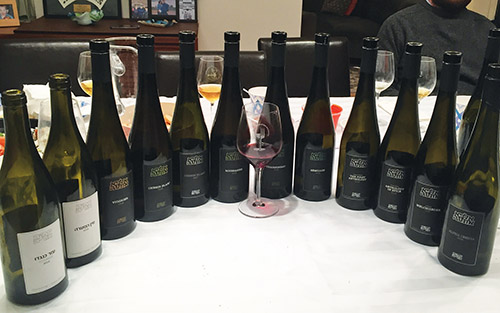




Kosher wine importer and sommelier Andrew Breskin recently arranged for a tasting of a number of wines from highly regarded Israeli winemaker Yaacov Oryah’s private winery. Since Breskin was busy having a baby the night of the tasting (mazel tov!), Avi Davidowitz, who writes the wine blog Kosher Wine Unfiltered, led a Teaneck tasting.
Breskin is the founder of Liquid Kosher, a members-only wine club that provides clients with access to some of the world’s best kosher wines, as well as rare, sought-after bottles to enhance their collection and elevate their experience. Breskin is the exclusive importer of Oryah’s wines to the United States, and offered a now-sold-out 12-bottle tasting set on his website for $629.99.
In addition to his work as the winemaker for Psagot, Oryah opened his own private winery where he allows his curiosity to drive his product and experiments with his specialty white wines. Oryah’s focus is on whites that can age more like reds, attracting investors who like to see the development of their bottles over a number of years. Oryah has amassed a sincere following for his skin-macerated wines, sometimes referred to as “orange wines,” which are fermented similarly to red wines. To paraphrase Yossie Horwitz, another well-known wine writer, orange may in fact be the new white.
Orange wine refers to wine for which the skins of the grapes are left to sit with the juices for an extended time, resulting in different flavors, a more amber color and increasing aging potential. His offerings are complex and diverse, and their Mediterranean character introduces the customer to new and unique flavors.
The excitement around the table was palpable, as for many of the tasters, this was their first foray into Oryah’s line of wines, and the marriage of his and Breskin’s expertise had everyone hoping for a very interesting evening.
The first offering was Soul Mate 2018. This was a traditionally made white, 55% chardonnay, 45% chenin blanc that carried acidic notes of apple and grapefruit. This was a favorite of many at the table because of its crisp delivery.
The only red of the night, Eye of the Storm 2016, followed. A GSM (grenache, syrah and mourvedre) Rhone blend with strong tannins and smoke on the nose, it would pair best with peppery food like charcuterie.
Next came the much-awaited skin-macerated wines, which get all their tannins from the skins and don’t touch oak at all. Since these wines are made to age, tasters might have trouble appreciating them when they are young and first opened. With this in mind, Davidowitz mentioned an experiment he and Oryah tried of tasting the same bottles over a few weeks, noting the changes in the wines over time and hinting at their aging potential.
Of the skin-macerated wines we tried, some were perplexing, with mixed initial impressions.
Some highlights that were more in the “drink now” range included the Chenin Blanc 2018, which was most similar to a regular chenin blanc and would be a good gateway wine for someone trying this style wine for the first time.
The Chardonnay 2018 had much in common with a traditional chardonnay, but with more apple notes as well as “layers of herbs,” said Davidowitz, which added a deeper level to the wine.
The 2018 First Anthology, a mix of chardonnay, chenin blanc and viognier, is in Davidowitz’s words “a call back to the first ‘orange wine’ made by Oryah.” The flavors in this wine combine for a real “wow” tasting experience.
Some of the offerings that were determined to need more time to really develop and reach their full potential were the Semillon 2018, Melchizedek 2017 and Alpha Omega 2016.
Wine clubs like Liquid Kosher are a rapidly growing industry, which shows the extent to which wine has become a serious hobby. Breskin shared, “Today, people rely on social media to pick wine instead of going into a store and relying on the person behind the counter.”
Other popular wine clubs like Herzog, Covenant, Hagafen and Hajdu all offer multiple levels of membership to tailor wines to clients’ preferences. Sommeliers like Breskin help collectors chase vintages and curate choices to appeal to their clientele, so customers know they are getting a product they will enjoy. However, according to Breskin, Liquid Kosher is “different than what is out there. Our primary service to people interested in exploring kosher wine is offering wine that is high quality and small production that is made for the club and limited production bottles that are offered only to members. Our focus is on wine that can be cellared, can be opened now and have the highest expressions of where they come from. We’re a club with a store, not a store with a club.”
Exclusive, high-level wines from all over the world delivered straight to your doorstep may cost a premium, but, “Expensive wine can still be a value if it’s good. You’re paying that price because it’s fantastic,” said Breskin.
As higher-end wines have become more widely available, Horwitz instituted a new monthly event for friends to gather and try older and exciting wines. He started what can only be referred to now as a movement. “Rosh Chodesh Clubs” now abound all across the U.S. and Israel, with new locations popping up all the time. These groups meet to share their prized bottles and discuss the wines over a beautifully paired meal.
Word travels. These wine clubs and events bring people of similar palates and interests together—some even traveling from out of state with the Oryah tasting in mind—proving that kosher wine as a hobby is ultimately about camaraderie and celebration.
By Michal Rosenberg
�










